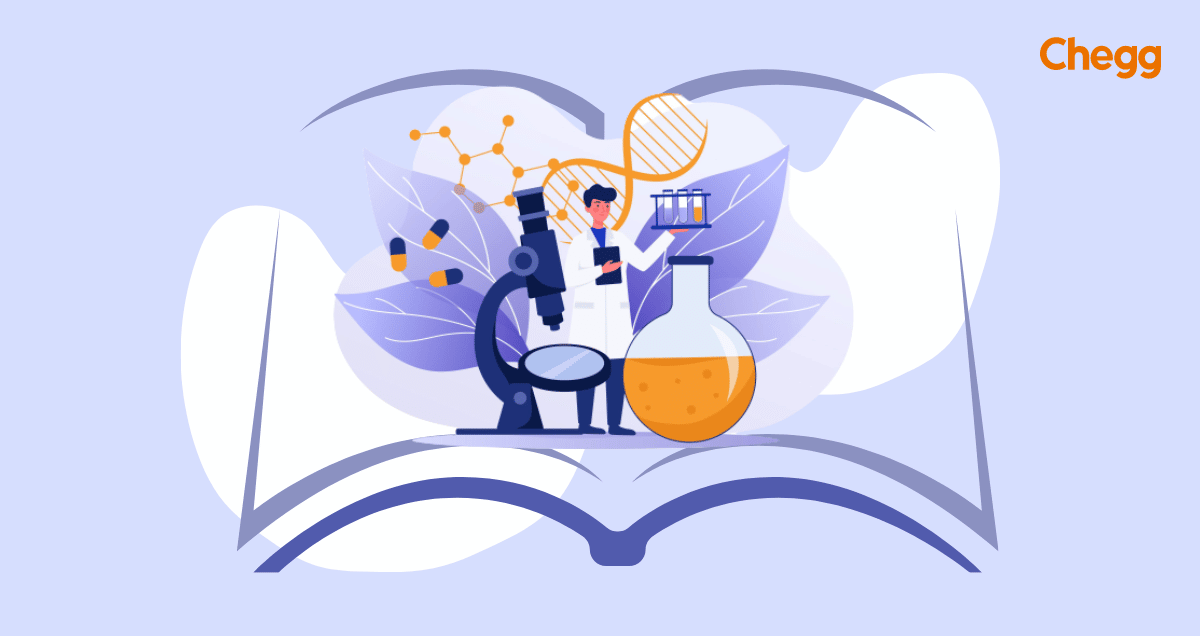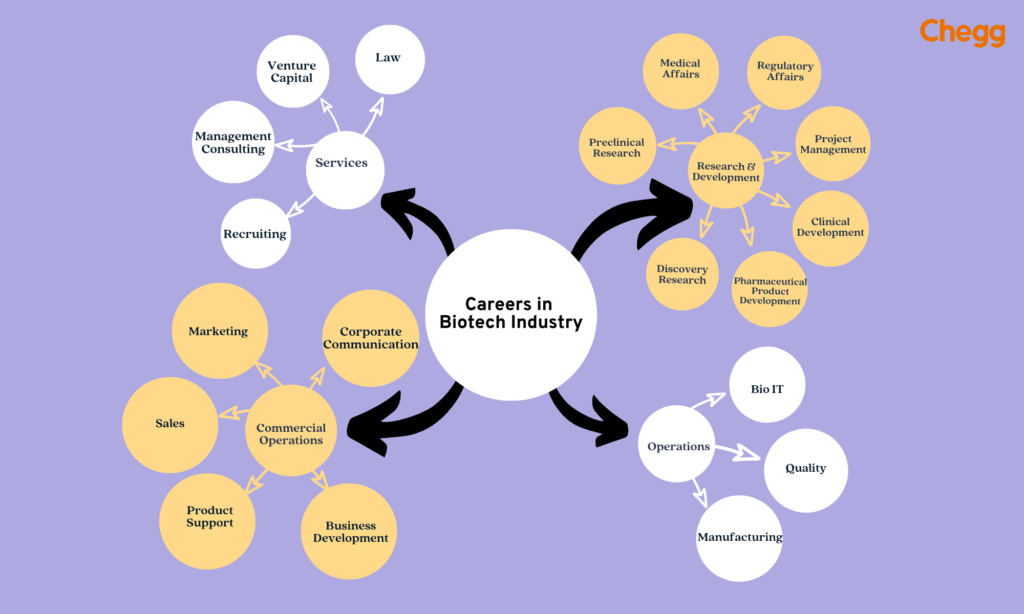

Quick Summary
- Looking to forge a career in cutting-edge fields like biometrics, synthetic organisms, or medical AI?
- Consider a BSc Biotechnology course—a 3-year undergraduate program delving into manipulating biological systems for innovation.
- With an 11.8% CAGR in the biotech market, opportunities abound.
- The course covers diverse subjects like Genetics, Immunology, and Industrial Biotechnology, preparing you for roles like Lab Technician, Epidemiologist, or Quality Controller.
- Top colleges include JMI New Delhi and Fergusson College Pune. Graduates can explore careers in agriculture, medicine, or environmental protection, or opt for roles in leading firms like Biocon or Bharat Biotech. With diverse career paths and lucrative prospects, BSc Biotechnology opens doors to a world of innovation and impact.
Table of Contents
Tracking attendance with the biometric system in the office, developing recyclable plastics with synthetic organisms or creating artificial intelligence for the medical field. All these inventions are the gifts of biotechnologists.
If you can also make a career in this field then doing a BSc Biotechnology course is the right choice for you.
With the CAGR rate of 11.8% the biotechnology market will only rise in success. To make a great career in this area, you need to start with a bachelor’s education in biotechnology, which opens.
Here you will get to know all about the BSc Biotechnology course and the career paths you can choose after this.
What is BSc Biotechnology Course?
Biotechnology is a branch of applied Biology. It is defined as a deliberate and controlled manipulation of biological systems (cell components or living cells) to efficiently develop or process various valuable products and technologies.
The BSc Biotechnology course is a 3-year undergraduate course. Under this course, students are taught how to use technology to develop necessary and proper products from living organisms.
Each year, almost 40,000 students enrol themselves in this undergraduate course. To apply for a bachelor’s in biotechnology course, one must pass the 10+2 level exam from any recognised board of education. A BSc Biotechnology course aspirant must have Biology, Physics, and Chemistry as compulsory subjects in their 10+2 exam.
BSc Biotechnology: Course Highlights
Now, let’s look at the biotech course details in the table below.
| Course Level | Undergraduate |
|
Course Duration |
Bachelor of Science Biotechnology |
|
Full Form |
3 years |
|
Eligibility |
Candidates must clear the 12th or an equivalent exam with a minimum of 55-60% marks. Some colleges also conduct an entrance admission test to admit freshers to the course. |
|
Subjects |
Plant Biotechnology, Principles of Immunology, Genetics, etc. |
|
Top Colleges |
JMI New Delhi, Mount Carmel College, St. Xavier College, Fergusson College, etc. |
|
Average Annual Fees |
Rs. 25,000 to 7,00,000 |
|
Top Recruiting Sectors |
Chemical Manufacturers, Biotechnology Consultation Agencies, Animal Husbandry, Hospitals, etc. |
|
Job Positions |
Lab Technician, Research Scientist, Biotech Analyst, Epidemiologist, etc. |
|
Average Annual Salary | Around Rs. 5.7 lakhs |
Also Read:
BTech Biotechnology – Course Details and Jobs
BSc Courses and Jobs in India

BSc Biotechnology Syllabus and Subjects
A Bachelor of Science in Biotechnology course is generally three years. These three years are divided into six semesters. The entire curriculum is divided into a series of 6 semesters. BSc biotechnology subjects for each semester are different. This is the list of semester-wise distribution of subjects.
Semester 1
|
Chemical and Physical Biology |
|
Introduction to Biotechnology and Cell Biology |
|
Biochemistry |
|
Fundamentals of Microbiology |
|
Introduction to Computer Science |
|
Biophysics and Instrumentation |
|
Macromolecular Analysis and Structure |
|
Cell Dynamics and Structure |
|
Biophysical Chemistry |
|
Biomathematics |
|
Genetics and Cell Biology |
Semester 2
|
Principles of Transmission Genetics |
|
Introduction to C-Programming and Digital Logic. |
|
Principles of Microbiology |
|
Organic Mechanisms in Biology |
|
Fundamentals of Biocomputing, Biostatistics, and Biochemistry |
|
Chemistry and Microbial Physiology |
|
Cytogenetic Techniques |
Semester 3
|
Principles of Immunology |
|
Microbial Genetics |
|
Plant Biotechnology |
|
Animal and Plant Tissue Culture- Techniques and Applications |
|
Fundamentals of Molecular Biochemistry |
|
Microbial Diversity |
|
Cellular Metabolism |
Semester 4
|
Molecular Biology Techniques |
|
Biodiversity and Taxonomy |
|
Animal Biotechnology |
|
Computational Biology and Bioinformatics |
|
Protein Science |
|
Molecular Genetics |
|
Introduction to Computer Networking, Numerical Analysis, and DBMS |
|
Environmental Biotechnology |
|
Bioinformatics and Analytical Techniques |
|
Genomics – Integrative Cell Biology |
Semester 5
|
Recombinant DNA Technology |
|
Industrial Biotechnology |
|
Environmental Biotechnology |
|
Immunology |
|
DNA Typing and Proteomics |
Semester 6
|
Model Organisms in Human Genome |
|
Introduction to Entrepreneurship |
|
Medical Biotechnology |
|
Element Management |
|
Applications of Biotechnology (Animals and Plants) |
|
Biotechnology – Ethical, Social, and Legal Issues |
|
Advanced Molecular Techniques |
|
Analytical Techniques |
|
Bioinformatics |
Read About More Branches of BSC:
Careers and Courses After BSc Nursing
Best Course to Do After BSc Botany
What To Do After BSc Chemistry?

Difference Between BSc Biotechnology and BSc Biology
Both Bachelor of Science in Biotechnology and BSc biology are 3-year-long undergraduate courses with few other similarities. Nevertheless, there are certain differences between the two courses.
|
BSc Biotechnology |
BSc Biology |
|
Biotechnology is a branch of biology |
Biology is a branch of science |
|
Biotechnology deals with the study of living organisms |
Biology deals with using living organisms to develop various products for human benefit. |
|
Biotechnology is based on botany and zoology. |
Biology is based on modern advancements in medical procedures and medicine. |
|
Biotechnology has more scope because it is a technical field. |
Biology has less scope than Biotechnology because it isn’t a technical field. |
Top Colleges for BSc Biotechnology
In India, there are about 1268 colleges that offer BSc biotech courses to aspiring candidates. But these 5 are top BSc Biotechnology colleges in India.
|
Institute Name |
No. of Seats |
Mode of Admission |
Estimated Fees (in INR) |
|
Fergusson College, Pune |
45 |
Merit-list based |
26,355 |
|
JSS Academy of Higher Education and Research, Mysore |
40 |
Merit-list based |
1.15 lakhs |
|
St. Xavier’s College, Ahmedabad |
45 |
Merit-list based |
29,995 |
|
JMI, New Delhi |
35 |
Merit-list based |
24,000 |
|
Loyola College, Chennai |
70 |
Merit-list based |
34,680 |

Jobs After BSc Biotechnology in India
|
Job Profile |
Average Salary (in INR) |
|
Lab Technician |
2.1 LPA |
|
Microbiologist |
2.4 LPA |
|
Biostatistician |
4 LPA |
|
Epidemiologist |
6 LPA |
|
Biochemist |
2.4 LPA |
|
Clinical Research Analyst |
4 LPA |
|
Medical Representative |
2.5 LPA |
|
Medical Writer |
4.6 LPA |
|
Biotechnology Instructor |
4.9 LPA |
|
Quality Controller |
2 LPA |
Salary Source: Ambitionbox, Payscale
1. Lab Technician
A Lab Technician, also known as a Laboratory technician, works in laboratory settings. They usually work on behalf of various healthcare facilities. A biotechnology laboratory technician also assists scientists in conducting various research activities.
Roles and Responsibilities
The roles and responsibilities of a Lab Technician are as follows:
- Collecting, preparing, and analysing body samples, such as tissues and blood.
- Maintaining laboratory equipment
- Procuring laboratory supplies
2. Microbiologist
A Microbiologist studies various microorganisms such as viruses, bacteria, and fungi. Microbiologists try to understand how such microorganisms grow, interest, and live in their environments. A microbiologist might work in laboratories, universities, or research institutes.
Roles and Responsibilities
The roles and responsibilities of a Microbiologist are as follows:
- Tracking the development of environmental microorganisms
- Growing microbe cultures
- Writing research papers, reviews, and reports.
3. Biostatistician
Biostatisticians collect and analyse data for public health purposes using statistics and math. They determine the factors influencing the health and overall well-being of animals, humans, and ecology. Using this knowledge, they deliver studies, predictions, and statistics on diseases and other health risks.
Roles and Responsibilities
The roles and responsibilities of a Biostatistician are as follows:
- Develop various methodologies for collecting data.
- Design clinical trials to evaluate new drugs
- Provide biostatistical consultation to clients
4. Epidemiologist
The job of an epidemiologist is to find the source of the outbreak of various infectious diseases. They also try to recognise those at risk from such outbreaks and figure out ways to prevent such contagious diseases from spreading. They might work in hospitals or teach in universities, it is a good career option after BSc Biotechnology.
Roles and Responsibilities
The roles and responsibilities of an Epidemiologist are as follows:
- Create and manage various public health programs.
- Analyse data and then find conclusions by performing laboratory tests.
- Trace the root causes of multiple diseases/infections
5. Biochemist
Biochemists study various physical, chemical, and biological properties of living organisms, such as cell development, heredity, and growth. They attempt to understand how certain types of chemical reactions happen in the tissues of various living organisms and the effects of medicines on the tissues of organisms.
A biochemist aims to improve the quality of human life by trying to understand living organisms at the molecular level.
Roles and Responsibilities
The roles and responsibilities of a Biochemist are as follows:
- Writing scholarly articles about the research findings.
- Raising funds for research projects.
- Studying the chemical processes, functions, and composition of living organisms.
Recommended Read: Best Career Options for You After BSc Biology
6. Clinical Research Analyst
Clinical research analysts work on various medical research projects to evaluate the efficiency and safety of various medical devices and drugs. They might work with clinical trial coordinators, nurses, doctors, and other healthcare professionals.
Roles and Responsibilities
The roles and responsibilities of a clinical research analyst are as follows:
- Recording research findings in a notebook or database for future reference.
- Conducting laboratory tests such as urinalysis and blood work.
- Coordinating clinical research studies by identifying and interacting with patients, collecting data, and tracking inventory.
7. Medical Representative
BSc Biotechnology graduates can also work as medical representatives. Medical representatives promote and sell pharmaceutical companies’ medications, medical equipment, and prescription drugs. They work as mediators between pharmaceuticals, healthcare professionals, and medical companies.
Roles and Responsibilities
The roles and responsibilities of a medical representative are as follows:
- Researching the performances of rival companies’ medications in the market.
- Developing and maintaining strong business relationships with customers to encourage them to purchase repeatedly.
- Scheduling appointments with various healthcare professionals, such as pharmacists and doctors, to promote a particular company’s medications.
8. Medical Writer
BSc Biotechnology graduates with a flair for writing can become medical writers once they finish their biotech course. A medical writer creates well-structured documents that include content for healthcare websites, clinical research documents, health magazines, news, and journals.
Medical writers write both non-regulatory and regulatory articles. Regulatory materials include documents written for various regulatory agencies to seek approval for multiple drugs, devices, and biologics. Such documents include study reports, clinical trial protocols, etc. Non-regulatory materials include promotional content and educational content.
Roles and Responsibilities
The roles and responsibilities of a medical writer are as follows:
- Liaising directly with authors/speakers and clients on various projects
- Monitoring deadlines to ensure that projects are delivered on time
- Assisting junior writers
9. Biotechnology Instructor
After obtaining a degree in Biotechnology, one can become a Biotechnology instructor. Biotechnology instructors are tutors who deliver engaging lectures on various concepts in the field of biotechnology. A biotechnology instructor works in various educational institutions such as schools, colleges, and universities.
Roles and Responsibilities
The roles and responsibilities of a Biotechnology instructor are as follows:
- Maintain lab equipment for inventory purposes.
- Conduct skill assessment tests.
- Develop course material.
10. Quality Controller
After completing a bachelor’s in biotechnology, one can become a quality controller. Quality controllers ensure that various companies’ quality of drugs and goods comply with the set organisational standards. They ensure that manufactured drugs and other products are safe and therapeutically active.
Roles and Responsibilities
The roles and responsibilities of a Quality Controller are as follows:
- Resolving various quality-related issues
- Training the quality assurance team
- Preparing documentation of the process of inspection.
Top Recruiters of Biotechnology Graduates
- Biocon
- Serum Institute of India
- Bharat Biotech
- Cadila Healthcare
- Lupin Limited
- Wockhardt Limited
- Dr Reddy’s Laboratories
- Sun Pharmaceutical Industries
- Reliance Life Sciences
- Syngene International
Scope After BSc Biotechnology in India
Bachelor of Science in Biotechnology graduates have a vast career scope other than doing the job. Some of the areas of scope for BSc Biotechnology graduates are:
- Agriculture: BSc biotechnology graduates have great demand in the agriculture field. As biotechnology is used in agriculture to improve crop yields, develop new crops, and protect crops from pests and diseases.
- Medicine: Biotechnology course graduates are required in the medical field to develop new drugs, diagnose diseases, and treat injuries.
- Food production: Your BSc biotechnology knowledge can be used in food production to improve the safety and quality of food, and to develop new food products.
- Environmental protection: Biotechnology is used to clean up pollution, develop new ways to conserve energy, and develop new ways to grow food.
Recommended Reads:
How Much You Can Earn After BSc Agriculture?
Career in BSc Nutrition and Dietetics in India
Boost Your Career with Biotechnology Course
BSc Biotechnology is fast emerging as one of the most lucrative fields in which one can build a career. A BSc in Biotechnology graduate would not find it difficult to bag a lucrative job opportunity. There are several career prospects like quality controller, lecturer, biochemist, and medical writer.
And if you don’t want to do a typical job then you can explore the career scope in fields like agriculture, food production, environmental protection and many more.
Evaluate numerous career choices to choose the right career path for yourself. Dive into our guide on Career Advice.
Frequently Asked Questions
Is BSc Biotechnology a good career?
Yes, BSc in Biotechnology is a good career option to choose. It is an undergraduate program which provides offers good job opportunities. After completing the biotechnology course, you will get career opportunities as:
1. Microbiologist
2. Biochemist
3. Medical writer
4. Medical Representative
What are BSc Biotechnology subjects?
The BSc Biotechnology course is divided into 6 semesters which have different subjects. Some of these subjects are:
1. Chemical and Physical Biology
2. Introduction to Computer Science
3. Principles of Transmission Genetics
4. Cytogenetic Techniques
5. Principles of Immunology
6. Fundamentals of Molecular Biochemistry
7. Biodiversity and Taxonomy
8. Recombinant DNA Technology
9. Applications of Biotechnology (Animals and Plants)
10. Advanced Molecular Techniques
What is the salary after BSc in Biotechnology?
Biotechnology course graduates are always in demand by various industries that offer them jobs with good pay. On average a biotechnology graduate can earn around 2LPA to 5LPA in a year. And as you gain experience, your pay will get better too.
What can I do after my BSc in Biotechnology?
After graduating with BSc Biotechnology, you will get to choose from a wide variety of career options. Some of the job opportunities that are available for a BSc Biotechnology graduate:
1. Biostatistician
2. Biochemist
3. Microbiologist
4. Biomedical Engineer
5. Lab technician
6. Epidemiologist
7. Medical content writer
To read more related articles, click here.
Got a question on this topic?